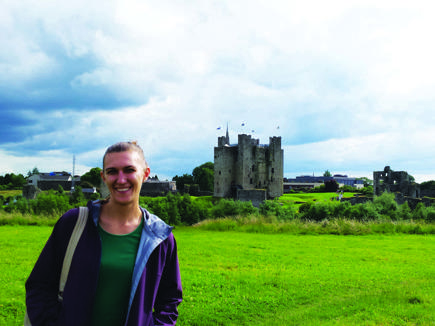Laura Slivinski
University of Colorado’s Cooperative Institute for Research in Environmental Sciences, at the NOAA Earth System Research Laboratory
Boulder, Colorado
Department: Physical Sciences Division
Education: B.S. Mathematics, University of Maryland at College Park, 2009; Ph.D. Applied Mathematics, Brown University, 2014
Career stage: Early—8 years post Bachelor’s

What She Does
Laura’s main responsibilities include producing an improved historical time series of the global weather (known as “reanalysis”). A typical day is mostly spent at a computer, either writing code to run experiments or writing code to analyze the resulting data. She also regularly meets with colleagues to discuss the results of her analysis and to determine the best path forward.
Necessary Job Skills
The underlying methods used to generate a reanalysis dataset rely heavily on probability and statistics. Weather estimates, and estimates of uncertainty, must be as accurate as possible. Scientific communication skills enable efficient and clear presentation of results and ideas to colleagues.
What I like best about my job is knowing that what I do matters.
Pros and Cons Of Her Job
The process of generating datasets can lead to improvements in weather and climate predictions. One downside to Laura’s profession is that her salary depends on grants, so while she has the flexibility to work on any project she chooses, she first needs to write a successful proposal in order to have funding.
Work/Life Balance
Laura ensures that she has a good life/work balance by working 40 hours a week (on average), and trying not to take on too many projects at once. University of Colorado employees get fairly good vacation time, so they have lots of opportunities to take advantage of living in Boulder. The opportunities she’s had to travel for work are one of the best perks of her career.
Career Path
When Laura started her undergraduate degree, she was fairly sure she wanted to do math or science, but she really had no idea beyond that. She took classes in math, physics, and some basic programming, and decided lab work wasn’t really for her, so she stuck with math. When she started her job search post-PhD, she realized that there were many opportunities to continue research outside of academia.
The one connecting thread throughout my career has been that I enjoy problem solving, especially if the solution has real-world impacts.
Career Expectations and Advice
You want a mentor—both for research and networking, and for travel support to workshops and conferences. Try to explore your potential careers through internships while you’re still a student. Particularly in graduate school, many departments assume that students will continue on the academic track, so if you’re interested in a non-academic career, you may need to search out non-traditional summer opportunities. While your fellow students may be continuing work on their thesis research, you might want to work on a side project at a nearby company or research lab instead.
If you go for your PhD, your advisor matters much more than the school you choose to attend.
Salary
$55k and up, depending on level (Research Scientist I, II, III, or Senior Scientist).
Stay Up-to-Date with Email Alerts
Sign up for our monthly newsletter and emails about other topics of your choosing.

